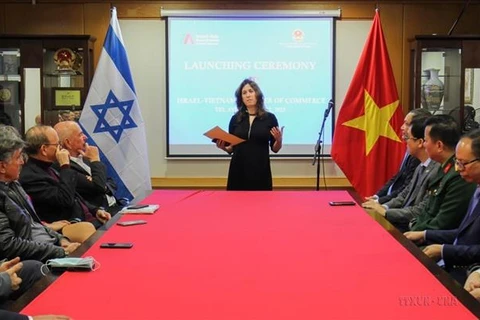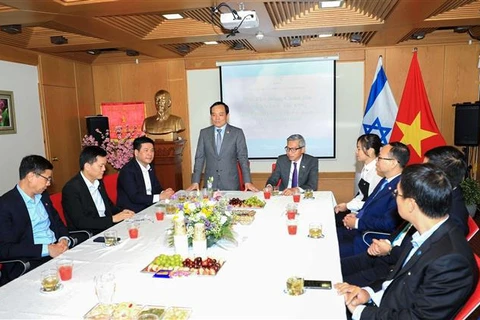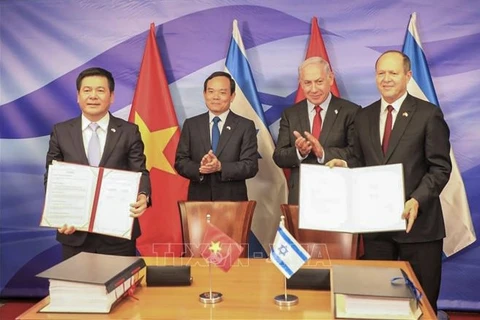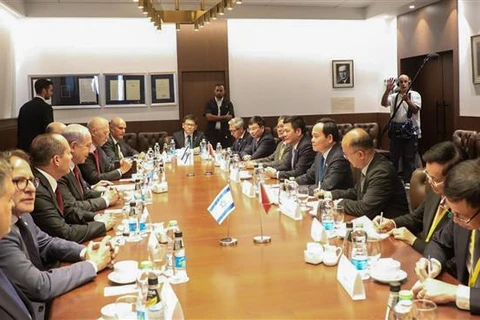Hanoi (VNA) – The signing and implementation of the Vietnam-Israel Free Trade Agreement (VIFTA) is expected to create favourable conditions for Vietnam to boost exports while accessing Israel's hi-tech goods, contributing to reducing production and business costs and improving the competitiveness of Vietnamese goods, said economists.
Improving domestic production capacity
The VIFTA was signed on July 25 by Vietnamese Minister of Industry and Trade Nguyen Hong Dien and Israeli Minister of Economy and Industry Nir Barkat in the witness of Israeli Prime Minister Benjamin Netanyahu and Vietnamese Deputy Prime Minister Tran Luu Quang.
A representative from the Ministry of Industry and Trade (MoIT) said the signing of the deal marks the tireless efforts of both countries after seven years with 12 rounds of negotiations. It also holds significance at a time when the two countries are celebrating the 30th anniversary of bilateral diplomatic ties. Israel is the first country in the Middle East that Vietnam has signed an FTA, and likewise Vietnam is the first country in Southeast Asia with which Israel has signed the deal.
According to the representative, Israel is now one of the top important partners in trade, investment, and labour of Vietnam. The economic structures of Vietnam and Israel are complementary, and their exports-imports do not directly compete but complement each other.
Economist Vu Vinh Phu said the two countries could support each other in terms of goods and hi-tech investment, which are areas of Israel’s strength and could serve as a means for Vietnam to enhance its domestic production capacity.
In particular, the potential of export-import between Vietnam and Israel remains significant. Currently, two-way trade is only 2 billion USD, with Vietnam experiencing a trade deficit. Therefore, the VIFTA presents an opportunity to increase the figure and balance the trade between the two sides.
More opportunities to access Middle East market
Each year, Israel spends roughly 35 billion USD on consumer goods which is also one of Vietnam's strengths.
 Israel is the first country in the Middle East that Vietnam has signed an FTA, and Vietnam is the first country in Southeast Asia that Israel has signed the deal (Photo: VietnamPlus)
Israel is the first country in the Middle East that Vietnam has signed an FTA, and Vietnam is the first country in Southeast Asia that Israel has signed the deal (Photo: VietnamPlus) Statistics show that every year, Israel is among the top 22 out of the over 100 seafood export markets of Vietnam, mostly shrimp, frozen squid, canned tuna, and tra fish, among others. Moreover, Vietnam's seafood products in Israel have gained a stable foothold and are highly preferred by the local consumers.
Therefore, the tax reduction roadmap outlined in this deal will create significant advantages for seafood exporters. It is worth noting that the VIFTA will also open up opportunities with the Middle East via the gateway with the United Arab Emirates (UAE).
Unlike other markets where Vietnam has FTAs, the Israeli market is predominantly composed of small- and medium-sized enterprises. Hence, the Vietnamese firms could partner with them to set up companies there. This cooperation will enable the Vietnamese enterprises to gain insights into market demand, consumer preferences, and tailor their products to suit Israeli consumers. Moreover, Israel can act as a valuable gateway for Vietnam to access the Middle East and the US.
 Vietnamese firms have a chance to expand markets and boost exports-imports in Middle East and the US (Photo: VietnamPlus)
Vietnamese firms have a chance to expand markets and boost exports-imports in Middle East and the US (Photo: VietnamPlus) Economist Ngo Tri Long suggested that relevant agencies should popularise the contents of the VIFTA widely among business community, socioeconomic organisations and associations to make the best use of the deal, including tax incentives.
He also noted that businesses need to consider the potential of cooperation and leverage opportunities, thus developing specific roadmap to each industry and product line./.
























